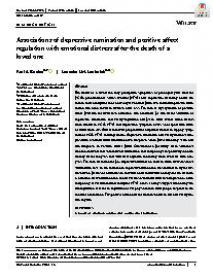Associations of depressive rumination and positive affect regulation with emotional distress after the death of a loved one
The death of a loved one may precipitate symptoms of prolonged grief disorder (PGD), posttraumatic stress disorder (PTSD), and depression. Brooding about the causes and consequences of one's negative affect (NA), also termed depressive rumination, has been linked to distress after loss. The role of dysregulation of positive affect (PA) has received less attention. We examined: (1) the factor structure of depressive rumination and PA dysregulation and (2) to what extent these factors were related to PGD, PTSD, and depression symptom-levels. Self-report data were included from 235 Dutch bereaved people who completed measures tapping symptoms of PGD, PTSD, and depression. Depressive rumination and PA regulation strategies were assessed with the Ruminative Response Scales (RRS) Brooding Scale and the Response to Positive Affect (RPA) Questionnaire (including three subscales: emotion-focused and self-focused rumination and dampening), respectively. Confirmatory factor analyses and structural equation modelling were used for data-analyses. The four-factor model (i.e., including depressive rumination and the three RPA subscales) showed the best fit. An increase in depressive rumination was related to higher distress levels (across all outcomes in univariate and multivariate analyses). An increase in emotion-focused rumination about PA was associated with less depression. More dampening of PA was related to higher PTSD levels. Findings suggest that, alongside the regulation of NA, the regulation of PA plays a role in how people respond to the death of a loved one. This points to the need for more research on NA and PA regulation in grief.
Geachte bezoeker,
De informatie die u nu opvraagt, kan door psychotraumanet niet aan u worden getoond. Dit kan verschillende redenen hebben,
waarvan (bescherming van het) auteursrecht de meeste voorkomende is. Wanneer het mogelijk is om u door te verwijzen naar de bron
van deze informatie, dan ziet u hier onder een link naar die plek.
Als er geen link staat, kunt u contact opnemen met de bibliotheek,
die u verder op weg kan helpen.
Met vriendelijke groet,
Het psychotraumanet-team.
In: Clinical Psychology & Psychotherapy ; ISSN: 1099-0879 | 27 | 6 | november | 955-964
https://onlinelibrary.wiley.com/doi/epdf/10.1002/cpp.2482


